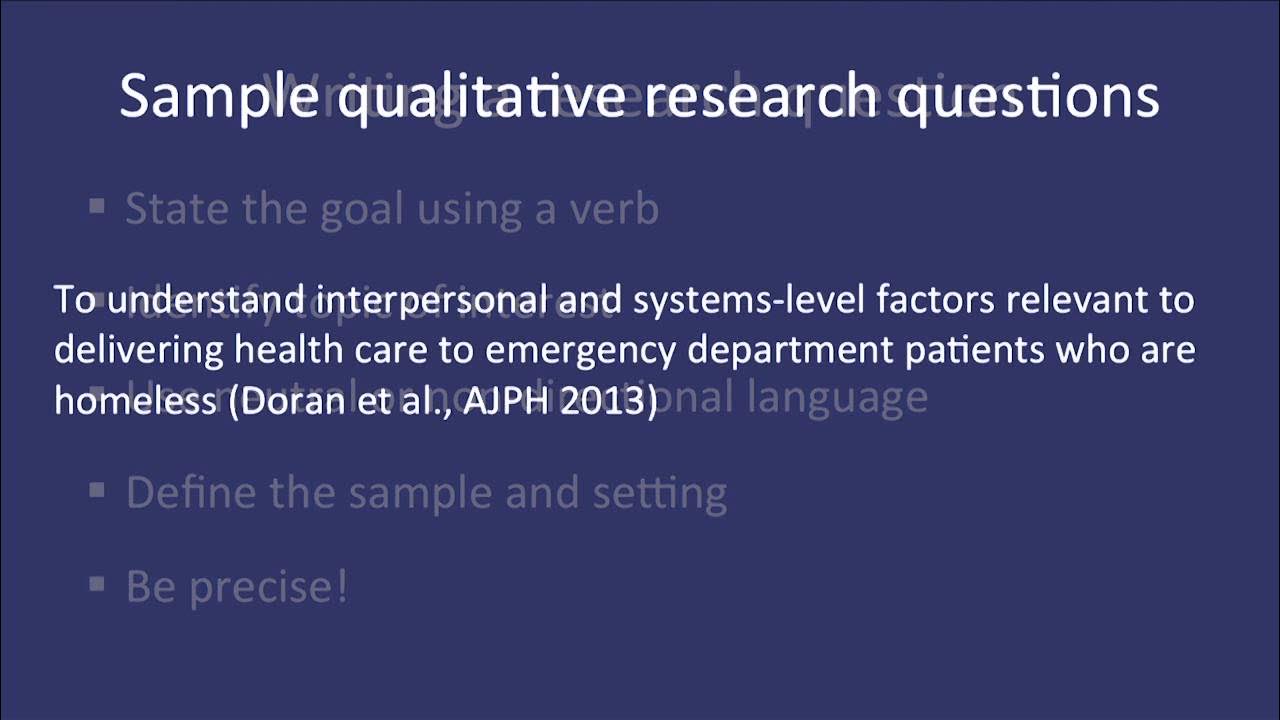Fundamentals of Qualitative Research Methods: Focus Groups (Module 4)
Summary
TLDRThis Yale School of Public Health module, led by Lesli Curry, delves into focus groups as a qualitative research method. It underscores the importance of group dynamics for generating narrative data, revealing social norms, and exploring sensitive topics. The module covers optimal group composition, discussion guide structuring, and moderator techniques. It also stresses analyzing group interactions, not just individual responses, to gain comprehensive insights.
Takeaways
- 😀 A focus group is a qualitative research method where a group of individuals with certain characteristics generate narrative data through a focused discussion.
- 👥 Group dynamics in focus groups are essential as they can widen the range of responses, activate forgotten details, and release inhibitions among participants.
- 🗣️ Focus groups are useful for exploring social and cultural norms, revealing how people talk about an issue, and discussing sensitive topics.
- 👥 The ideal group size for a focus group is 5 to 10 participants to ensure dynamic interaction and equal opportunity for each member to contribute.
- 📊 It's recommended to have three to five focus groups per strata to capture diverse perspectives within a specific demographic or category.
- ⚖️ Attention to group composition is critical to avoid power differentials and ensure a balance between homogeneity and heterogeneity.
- 🎨 Data collection in focus groups should stimulate conversation, with the goal of generating a ripple effect from a single point of discussion.
- ❓ A well-structured discussion guide with no more than 8 to 12 questions is key to a successful focus group, with a mix of quick and deeper discussion questions.
- 🗣️ Moderators play a crucial role in facilitating focus groups, requiring strong interviewing skills, keen observational skills, and the ability to guide the discussion without bias.
- 🔍 Analysis of focus group data should consider the group as the unit of analysis, focusing on group interactions and consensus rather than individual responses.
- 👂 Non-verbal cues are important in focus groups, with a second person often present to observe and note these dynamics.
Q & A
What is the primary goal of the module series on qualitative research methods?
-The primary goal is to enhance the capacity to conceptualize, design, and conduct qualitative research in the Health Sciences.
What is the main focus of this particular module?
-This module focuses on a major qualitative study design known as focus groups.
What is a focus group and why are group dynamics essential?
-A focus group is a group of people with certain characteristics who generate narrative data in a focused discussion. Group dynamics are essential because they can widen the range of responses, activate forgotten details, and release inhibitions, making people feel comfortable in describing their experiences.
How can focus groups be useful in the Health Sciences?
-Focus groups can be useful for characterizing social and cultural norms around health areas, health behaviors, or types of health care delivery. They can also reveal how people talk about an issue and are useful for exploring potentially sensitive topics.
What is the recommended group size for focus groups?
-The recommended group size for focus groups is five to ten participants.
Why is it important to have three to five groups per strata in focus group studies?
-Having three to five groups per strata ensures a sufficient sample size to capture a range of perspectives within each subgroup and helps to avoid bias or skewed results.
What considerations should be taken into account when assembling focus groups?
-When assembling focus groups, considerations include avoiding power differentials, considering homogeneity and heterogeneity, deciding between strangers or acquaintances, and determining the balance between experts and novices.
What is the purpose of a discussion guide in focus group studies?
-A discussion guide in focus group studies is used to structure the conversation, ensuring that key topics are covered while allowing for natural dialogue and group interaction.
Why is it important for questions in a discussion guide to be open-ended?
-Open-ended questions are important because they allow participants to generate and shape the direction of the discussion without leading them in any particular direction.
What are some moderator skills required for conducting effective focus groups?
-Moderator skills required include strong interviewing techniques, keen observational skills, the ability to control and guide the discussion, suppressing personal views, and respecting participants.
How should the analysis of focus group data differ from the analysis of individual interviews?
-The analysis of focus group data should consider the group as the unit of analysis rather than individuals. It should focus on themes and consensus within the group and pay attention to group dynamics.
Outlines

このセクションは有料ユーザー限定です。 アクセスするには、アップグレードをお願いします。
今すぐアップグレードMindmap

このセクションは有料ユーザー限定です。 アクセスするには、アップグレードをお願いします。
今すぐアップグレードKeywords

このセクションは有料ユーザー限定です。 アクセスするには、アップグレードをお願いします。
今すぐアップグレードHighlights

このセクションは有料ユーザー限定です。 アクセスするには、アップグレードをお願いします。
今すぐアップグレードTranscripts

このセクションは有料ユーザー限定です。 アクセスするには、アップグレードをお願いします。
今すぐアップグレード関連動画をさらに表示

Fundamentals of Qualitative Research Methods: Developing a Qualitative Research Question (Module 2)

Fundamentals of Qualitative Research Methods: Data Analysis (Module 5)

How do focus groups work? - Hector Lanz

Qualitative Market Research: Qualitative market research method in market research

Qualitative & Quantitative Research - An Introduction

Quantitative vs.Qualitative Data
5.0 / 5 (0 votes)
